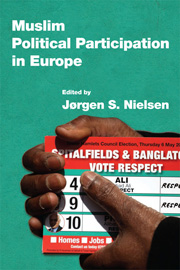Book contents
- Frontmatter
- Contents
- List of tables and figures
- 1 Introduction
- Part One Laying foundations: national and local elections
- Part Two Participation as integration
- 7 Muslim collective mobilisations in contemporary Europe: new issues and new types of involvement
- 8 How politically integrated are Danish Muslims? Evidence from the Muhammad cartoons controversy
- 9 Limits and potentialities of the Italian and British political systems through the lens of Muslim women in politics
- 10 Representing ‘Islam of the banlieues’: class and political participation among Muslims in France
- Part Three Institutions as gateways
- Part Four Breaking the bounds
- Notes on the contributors
- Index
8 - How politically integrated are Danish Muslims? Evidence from the Muhammad cartoons controversy
from Part Two - Participation as integration
Published online by Cambridge University Press: 05 October 2013
- Frontmatter
- Contents
- List of tables and figures
- 1 Introduction
- Part One Laying foundations: national and local elections
- Part Two Participation as integration
- 7 Muslim collective mobilisations in contemporary Europe: new issues and new types of involvement
- 8 How politically integrated are Danish Muslims? Evidence from the Muhammad cartoons controversy
- 9 Limits and potentialities of the Italian and British political systems through the lens of Muslim women in politics
- 10 Representing ‘Islam of the banlieues’: class and political participation among Muslims in France
- Part Three Institutions as gateways
- Part Four Breaking the bounds
- Notes on the contributors
- Index
Summary
Introduction, questions and the limitations of the study
The degree of political integration of minorities in a society is a significant indicator of the ‘health’ of a democracy and social cohesion. Political integration is of great importance to feelings of belonging and shared identity. The inadequate political integration of minorities can potentially lead to social division, parallel societies, mutual distrust and conflict. In Denmark, the level of political participation and integration of Muslim minorities has been an issue of public debate for at least the last decade. In contrast to the debate in countries like France and Germany, the debate in Denmark has been less about formal voting rights for non-nationals or the establishment of a Muslim council with whom the government can discuss issues of special concern (although these issues have come up). Rather, the debate about political integration of Muslim minorities in Denmark has been driven by general concerns about the level of Muslim trust in and acceptance of Danish political institutions – their willingness to engage in democratic procedures and adhere to the fundamental values and principles of liberal democracy when doing so. An element of this debate has concerned the degree to which Danish society and majority institutions should accept and adapt to growing ethno-cultural diversity. In the context of the ‘value struggle’ launched by the right-of-centre government, which took office in 2001, the social and political integration of Danish Muslims has been questioned with reference to Muslim parallel institutions (schools, kindergartens, organisations, etc.), ghetto formation, and a lack of commitment to democratic principles and liberal values such as freedom of speech and gender equality.
- Type
- Chapter
- Information
- Muslim Political Participation in Europe , pp. 140 - 162Publisher: Edinburgh University PressPrint publication year: 2013



